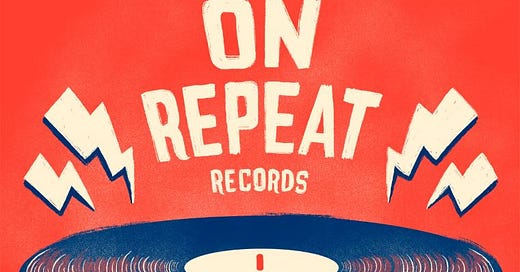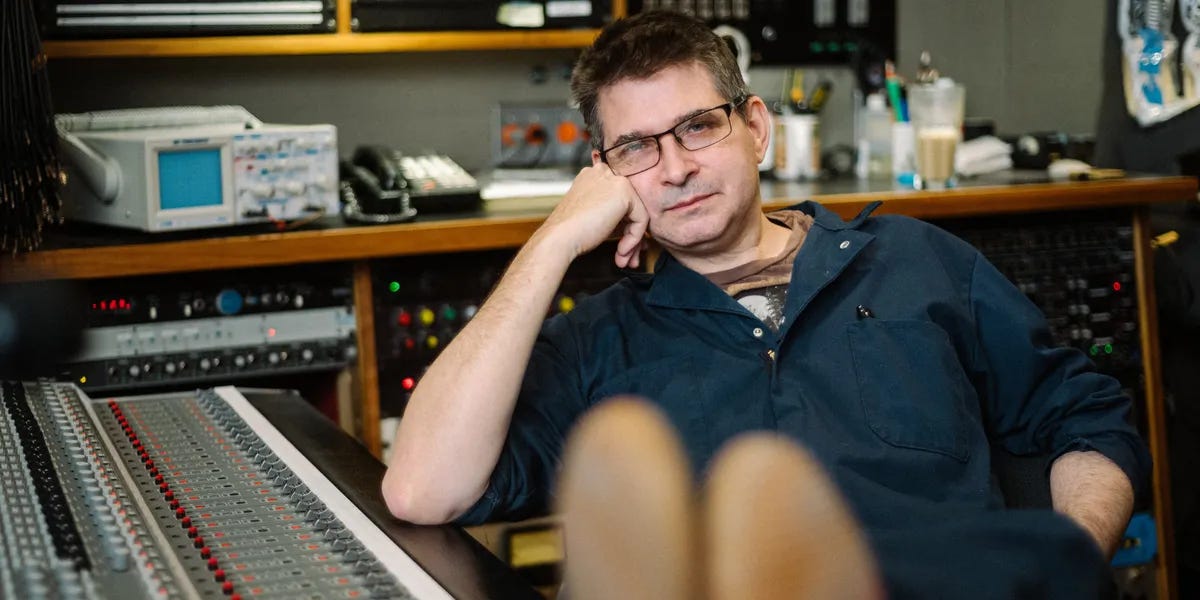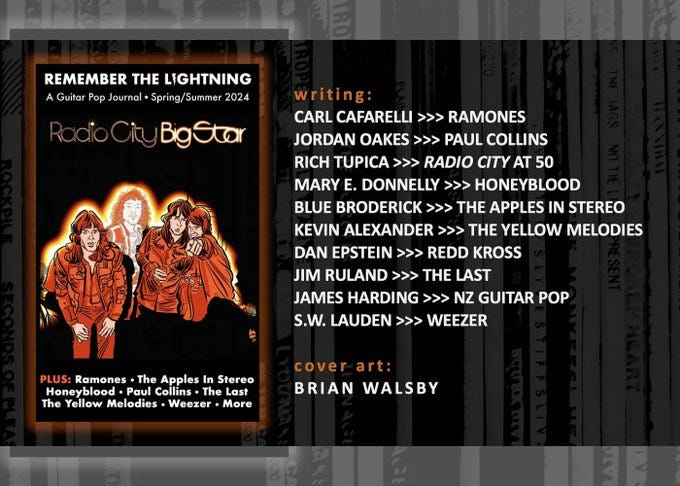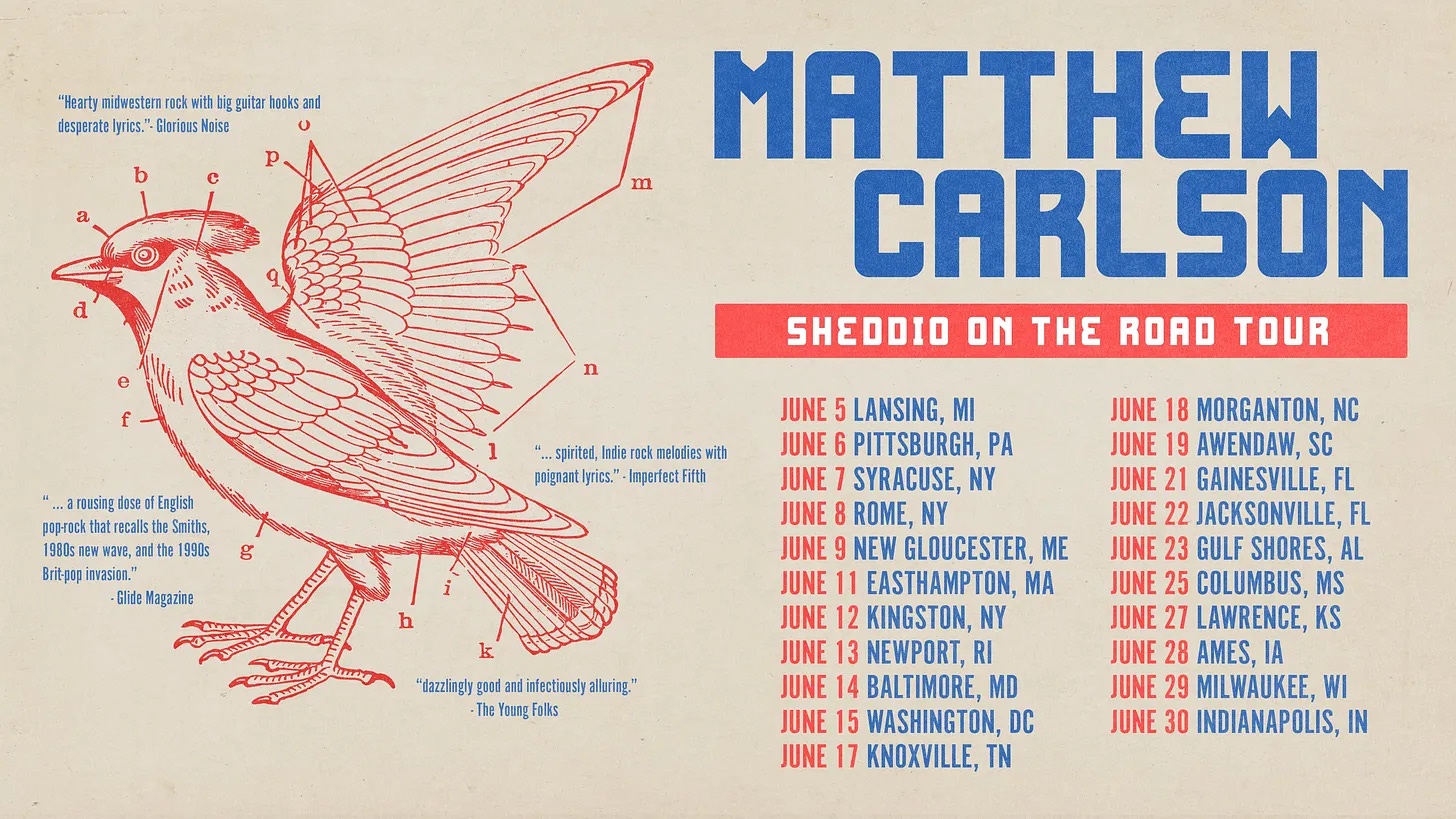Welcome to another edition of For The Record, the weekly newsletter that brings the world of music news straight to your inbox. Part essay, part good old-fashioned link drop, this is a benefit for paid supporters of On Repeat.
On Repeat is 100% reader-funded. You can back independent ad-free music journalism for less than $1 a week.
NOTE: No paywall this week; there is too much cool stuff going on that I want to share with you. If you like what you see, consider the tin cup out and kick in what you can.
Thanks!
KA~
This week, we’ve got news on Steve Albini, Travis Scott, and Matt Carlson.
All that and a lot more, including The Magnetic Fields, Mama Cass, and a fantastic music writing project you should know about.
This last week has been a helluva year. Let’s get to it!
📻📻📻
We lost Steve Albini this week. If you’re reading this newsletter, odds are good that he produced or played on one of your favorite records.
By now, you’ve likely read quite a few tributes, and if you're as terminally online as I am, your timelines have likely been flooded with praise of his work and a lament of his loss.
He played in bands like Big Black and Shellac, who both made an impact, but it’s safe to say his work as an ‘audio engineer’ was exponentially greater. Over roughly four decades, he was behind the boards for literally 100s of records. It’s not an overstatement to say that he helped shape what indie rock looked like and changed the course of music history. I’m also not exaggerating when I say that at least one of these records changed my life. If my timeline is any indication, there are hundreds, if not 1000s, of people out there like me.
Maybe you’re one of them?
With such an impressive CV and inexhaustible supply of street cred, it would've been easy for Albini to rest on his laurels and coast through the back half of life. Depending on the location, the odds are good that he’d never have to pay for his own drink. But he wasn't wired that way; to me, that is part of his enduring appeal.
My preference is not to be named because I feel like my role on the record is not that important, ultimately. The band wrote all the songs and performed everything and made the decisions, then they went out on the road and developed an audience willing to buy it. So the band is doing all the work, I’m sort of part of the equipment.1
~Steve Albini
This someone intensely disliked the term producer, preferring “audio engineer” instead. This wasn't false humility so much as it was his insistence that his role was to facilitate the band’s work, not make it his own. If you read the liner notes for 24-Hour Revenge Therapy, some of the engineering is credited to someone named ‘Fluss.’
Fluiss was Albini’s cat.
He was much more interested in capturing the sound/style a band brought to the studio than putting his imprint on it, stating in his now-infamous proposal to Nirvana:
I'm only interested in working on records that legitimately reflect the band's own perception of their music and existence. If you will commit yourselves to that as a tenet of the recording methodology, then I will bust my ass for you…and I consider the band the most important thing, as the creative entity that spawned both the band's personality and style and as the social entity that exists 24 hours out of each day. I do not consider it my place to tell you what to do or how to play.
He also regarded his work the same way a plumber might: someone brought in to do a specific job, get paid fairly for said job, and that’s that. The idea of earning royalties on music someone else created was a bridge too far for him.
In an ecosystem where artists were constantly being preyed on (or mined for more money), this was refreshing and, if anything, only elevated his status.
I want to do things in a certain way that I can be proud of that is sustainable and is fair and equitable to everybody that I interact with. If I can do that, then that’s a success, and success means that I get to do it again tomorrow.”2
In Utero isn’t my favorite record by the band, but 30 years on, it is for many, and Albini had a huge hand in that.
He had a reputation as hard to work with or the ever-ambiguous “difficult,” but all masters are. Outside the studio, he had a reputation as a bit of an edge lord. He was saying the same things many people were at the time; he just had a larger podium to do it from. To his credit, he acknowledged a lot of those missteps. He also never backed away from them or tried to hide who he had been. How could he? He batted away attempts at canceling him as most of us bat away gnats. This was refreshing in an era of performative self-flagellation and hollow promises to do better.
Right to the end, he was helping make records that would change people’s lives. He had also changed his own. He was older and wiser, but by no means softer, never afraid to take a shot at a Black Cow sacred cow and being hilarious while doing it. As an engineer, he was as brilliant with his takedowns as he was building incredible records. He was no longer an ‘edge lord,’ but he never lost his edge,
It’s fair to say that he was an incredible success by his own definition, and the effects of his loss will be felt for some time.
This one stings.
More:
Rolling Stone: 17 essential Albini records
The ‘Problem With Music’ according to Albini.
A monster playlist of albums Albini recorded.
More tributes here.
If you have a favorite Albini record or other thoughts, please share them!
📻📻📻
Various Artists:
From the Dept. of cool people doing cool shit: ‘Remember The Lightning—A Guitar Pop Journal, Vol. 3.’ is out!
The latest project by friend of On Repeat has some of your favorite music writers covering some of our favorite records. I was—and am— beyond thrilled to have been a part of it.
We’ve talked a lot lately about how indie music writing is alive and well- this is People’s Exhibit A.
Print and e-book versions are available. Please feel free to share widely and buy 10 copies.
📻📻📻
Behind the scenes, however, things were less serene. On the one hand, the Ellingtonians were “almost without exception excellent ambassadors and representatives of an America which the world might better know, for its profit and our own,” as newly minted foreign service officer and Ellington handler Tom Simons recorded in his official report on the trip. But on the other, Simons saw them as “the worst disciplined big band in America.” The jazzmen preferred raucous cabarets to embassy receptions, nighttime carousing to daytime sightseeing, and unmarried women to other kinds of companions. They rightfully wondered, Simons recalled, why they played almost exclusively for “prestige audiences” and other Americans, rather than ordinary people “clustered around tea-shop radios.” They also wondered “why they should be sent halfway around the world, at significant expense, to play for people who already liked jazz.” Simons lived in perpetual fear that, “were some private activities of group members to become public, this publicity would hurt the image, not only of the group, but of the nation which they necessarily represented at every moment.”
Duke Ellington: from jazz legend to diplomat.
“As she had learned early on, the best way to deal with an uncomfortable situation is with humor,” Elliot-Kugell, who has her mother’s cascading hair and dry wit, writes in her new memoir, “My Mama, Cass.” But, as she said over lunch, that doesn’t mean her mother was always laughing on the inside. “That pain had to go somewhere,” Elliot-Kugell told me. “When I think about some of the things that had allegedly been said to her during her lifetime, you can’t hear that over and over and not let it hurt.”
But of course, the most enduring joke at her expense was the one she didn’t live to tell, or to rebut. Have you heard the one about the ham sandwich?
Long read: The death of Mama Cass, and how an act of caring became the genesis of a horrible myth/legacy.
Travis Scott & Live Nation have settled all but one lawsuit tied to Astroworld.
The worst commercial you’ll see all week.
Miki Berenyi dropped a new single. So did Washed Out.
Mill Valley Music Festival is the first to run 100% on Zero-E batteries.
Bad Brains’ I Against I is getting remastered/reissued. Duran Duran will be doing the same with their first 5 records.
A new tribute album called Metal Machine Muzak is daring to take on Lou Reed’s Metal Machine Music.
Spotify to pay songwriters ~$150M less next year after plan changes take effect.
Graham Nash is hitting the road. Friend of On Repeat
is doing the same. A west coast swing is coming later in the fall.For today’s playlist, I attempted something that I found very, very difficult: choosing my 10 favorite tracks off “69 Love Songs.” In classic Amplifier fashion, though, I found the task impossible and allowed myself one extra song. I can already hear some of you shouting at your screens — “What, no ‘I Don’t Want to Get Over You’? And no ‘Reno Dakota’?!” — but these are just my personal picks. One of the most enjoyable parts of dissecting this dense album is comparing notes with other fans; everyone seems to have their own quirky and somewhat inexplicable preferences. (I almost put “Kiss Me Like You Mean It” on this list, for example.)
The Magnetic Fields’ seminal 69 Love Songs record is turning 25 this year. The band is doing a short run of dates to play the entire album. Recently, Lindsay Zoladz listed her favorite Top 10, er, 11 songs from the record in the paper of record.
If you have a favorite (or three) from this record, I’d love to hear what they are!
📻📻📻
AV Club:
📻📻📻
Got a hot tip, take, or news story? Want to see more/less of something in these weekly updates? Hit me up! My DMs are open.
Enjoy your weekend!
Drive South,
Kevin—
https://pitchfork.com/features/article/10061-the-definitive-oral-history-of-jawbreakers-24-hour-revenge-therapy/
https://chicago.suntimes.com/columnists/2021/9/7/22625278/steve-albini-big-black-sound-engineer-producer-nirvana-success-retirement-hearing










I loved Big Black. They were one of the first "new garage" bands I found, post-80s punk (which is where I think a lot of Silvertone amps ended up). I can't watch any episodes of Speed Racer without cuing up "Racer X" in my head. Rest in peace, Steve.
Great piece. One of my first translation professors at uni said we know we do a good job when they can’t see us. When we let the author shine, when we connect the author’s message to a new audience. This reminded me a lot of this. The hard work behind the scenes. Others want to steal the spotlight but the great ones let others shine. Happy weekend!